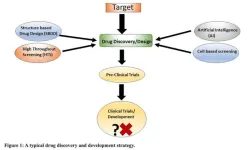(Press-News.org)
THIS PRESS RELEASE IS EMBARGOED UNTIL FEBRUARY 5, 2024 at 3:00 PM U.S. EASTERN TIME
Many Indigenous peoples and local communities around the world are leading very satisfying lives despite having very little money. This is the conclusion of a study by the Institute of Environmental Science and Technology of the Universitat Autònoma de Barcelona (ICTA-UAB), which shows that many societies with very low monetary income have remarkably high levels of life satisfaction, comparable to those in wealthy countries.
Economic growth is often prescribed as a sure way of increasing the well-being of people in low-income countries, and global surveys in recent decades have supported this strategy by showing that people in high-income countries tend to report higher levels of life satisfaction than those in low-income countries. This strong correlation might suggest that only in rich societies can people be happy.
However, a recent study conducted by ICTA-UAB in collaboration with McGill University in Canada suggests that there may be good reasons to question whether this link is universal. While most global polls, such as the World Happiness Report, gather thousands of responses from the citizens of industrialized societies, they tend to overlook people in small-scale societies on the fringes, where the exchange of money plays a minimal role in everyday life and livelihoods depend directly on nature.
The research, published in the scientific journal Proceedings of the National Academy of Sciences (PNAS), consisted of a survey of 2,966 people from Indigenous and local communities in 19 globally distributed sites. Only 64% of surveyed households had any cash income. The results show that "surprisingly, many populations with very low monetary incomes report very high average levels of life satisfaction, with scores similar to those in wealthy countries," says Eric Galbraith, researcher at ICTA-UAB and McGill University and lead author of the study.
The average life satisfaction score across the studied small-scale societies was 6.8 on a scale of 0-10. Although not all societies reported being highly satisfied – averages were as low as 5.1 - four of the sites reported average scores higher than 8, typical of wealthy Scandinavian countries in other polls, “and this is so, despite many of these societies having suffered histories of marginalization and oppression”. The results are consistent with the notion that human societies can support very satisfactory lives for their members without necessarily requiring high degrees of material wealth, as measured in monetary terms.
"The strong correlation frequently observed between income and life satisfaction is not universal and proves that wealth - as generated by industrialized economies - is not fundamentally required for humans to lead happy lives," says Victoria Reyes-Garcia, ICREA researcher at ICTA-UAB and senior author of the study.
The findings are good news for sustainability and human happiness, as they provide strong evidence that resource-intensive economic growth is not required to achieve high levels of subjective well-being.
The researchers highlight that, although they now know that people in many Indigenous and local communities report high levels of life satisfaction, they do not know why. Prior work would suggest that family and social support and relationships, spirituality, and connections to nature are among the important factors on which this happiness is based, "but it is possible that the important factors differ significantly between societies or, conversely, that a small subset of factors dominate everywhere. I would hope that, by learning more about what makes life satisfying in these diverse communities, it might help many others to lead more satisfying lives while addressing the sustainability crisis," Galbraith concludes.
END
It’s true, happiness doesn’t cost much
2024-02-05
ELSE PRESS RELEASES FROM THIS DATE:
Lighting up Alzheimer’s-related proteins to allow for earlier disease detection
2024-02-05
Many neurodegenerative diseases, including Alzheimer’s and Parkinson’s, are difficult to diagnose before symptoms begin to appear. However, disease-related biomarkers such as aggregated proteins called amyloids could provide important insight much earlier, if they can be readily detected. Researchers publishing in ACS Sensors have developed one such method using an array of sensor molecules that can light up amyloids. The tool could help monitor disease progression or distinguish between different ...
HHMI Janelia scientists Eric Betzig and Harald Hess to be inducted into the National Inventors Hall of Fame
2024-02-05
Janelia scientists and longtime collaborators Eric Betzig and Harald Hess will be inducted into the 2024 class of the National Inventors Hall of Fame for their invention of photoactivated localization microscopy (PALM), a pioneering imaging technology that enables scientists to image live cells in super-resolution to study biological structures and processes in unprecedented detail.
Betzig, a senior fellow at Janelia and an HHMI Investigator at the University of California, Berkeley, and Hess, a senior ...
Violence is contagious among members of Italian mafia groups, study shows
2024-02-05
Violence spreads in a contagious way like a disease among members of the Italian mafia, a new study shows.
Researchers have found committing violent acts with others increases the likelihood people in these groups will go on to carry out more violent offences in the future.
The analysis of the criminal careers of organised crime offenders shows previous violence has a “persistent and long-lasting” impact on their behaviour.
Prior violent co-offending has a greater impact than prior violent solo offending on the probability of future violence. Prior violent co-offending increases the probability ...
Petrina Kamya, Ph.D., Head of AI Platforms at Insilico Medicine, presents at BIO CEO & Investor Conference
2024-02-05
Petrina Kamya, PhD, Head of AI Platforms and President of Insilico Medicine Canada, will present at the BIO CEO & Investor Conference happening Feb. 26-27 at the New York Marriott Marquis in New York City. Dr. Kamya will speak as part of the panel “AI within Biopharma: Separating Value from Hype,” on Feb. 27, 1pm ET along with Michael Nally, CEO of Generate: Biomedicines and Liz Schwarzbach, PhD, CBO of BigHat Biosciences.
The session will look at how the latest artificial intelligence (AI) tools – including generative AI and large language models – ...
The fate of drug discovery in academia; dumping in the publication landfill?
2024-02-05
“[...] fruitful efforts to bring more drugs from bench to bedside could only be possible if we do not leave them ‘midway’!”
BUFFALO, NY- February 5, 2024 – A new editorial paper was published in Oncotarget's Volume 15 on January 24, 2024, entitled, “The fate of drug discovery in academia; dumping in the publication landfill?”
In this new editorial, researchers Uzma Saqib, Isaac S. Demaree, Alexander G. Obukhov, Mirza S. Baig, Amiram Ariel, and Krishnan Hajela, from Devi Ahilya Vishwavidyalaya, Indore, discuss drug discovery—a tedious process that is time consuming in both divulging whether a molecule is efficacious and specific in hitting ...
Currently stable parts of East Antarctica may be closer to melting than anyone realized
2024-02-05
In a warming climate, meltwater from Antarctica is expected to contribute significantly to rising seas. For the most part, though, research has been focused on West Antarctica, in places like the Thwaites Glacier, which has seen significant melt in recent decades.
In a paper published Jan. 19 in Geophysical Research Letters, researchers at Stanford have shown that the Wilkes Subglacial Basin in East Antarctica, which holds enough ice to raise global sea levels by more than 10 feet, could be closer to runaway melting than anyone realized.
“There hasn’t been much analysis in this region – there’s huge ...
System for early diagnosis of gastrointestinal cancers
2024-02-05
Gastrointestinal cancers (GCs) are among the most common forms of cancer and account for as much as one-third of all cancer deaths worldwide. Early diagnosis is an effective way of reducing the mortality associated with GCs, and endoscopic screening has proved to be an excellent approach for detecting potentially malignant tumors.
To extend the benefits of screening programs to as many people as possible, the imaging systems used should be inexpensive to manufacture and operate, yet accurate enough ...
Study: weight loss surgery most effective for long-term blood pressure control
2024-02-05
Bariatric surgery is more effective in controlling hypertension rates, or high blood pressure, in people with obesity and uncontrolled high blood pressure compared to blood pressure medication alone, according to a study published today in the Journal of the American College of Cardiology. People who underwent bariatric surgery had lower BMI and were on fewer medications after five years while maintaining normal blood pressure levels than those who only used antihypertensive medications.
According to the CDC, the U.S. obesity and hypertension rates in adults are 41.9% and 45.4%, respectively. Obesity is a known ...
Study confirms fears that COVID pandemic reduced kindergarten readiness
2024-02-05
Numerous studies have raised alarms about how the COVID-19 pandemic disrupted learning, development and mental health among school-aged children. But few have focused on the effects felt by the 22 million children under age 6 who were not yet in school.
Now a study published Feb. 5, 2024, in JAMA Pediatrics, led by researchers at Cincinnati Children’s in collaboration with the Cincinnati Public Schools, documents the pandemic’s harmful effects on kindergarten readiness. The findings are based on data from about 8,000 kindergartners who took ...
MSU making voice-activated artificial intelligence more accessible
2024-02-05
MSU has a satellite uplink/LTN TV studio and Comrex line for radio interviews upon request.
EAST LANSING, Mich. – As artificial intelligence technology advances, one area lags behind: voice-activated AI. For the more than 80 million people who stutter, voice AI technologies, which are increasingly being used in job hiring practices, can still be impossible to navigate.
HeardAI, a multidisciplinary project from Michigan State University, Western Michigan University, and the nonprofit Friends: The National Association of Young People Who Stutter, has advanced to Phase 2 of the National Science Foundation’s Convergence Accelerator program to ...



